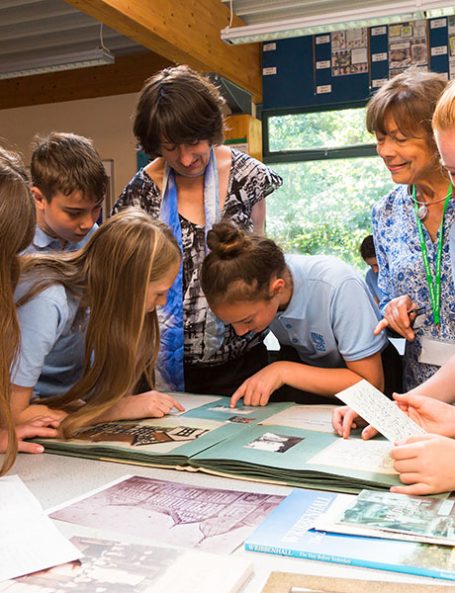Introduction into historical skills using inference and perception, examining a variety of sources from pictures, science reports and a variety or primary and secondary sources.
History Year 7, 8, 9
Year 7 History Course Modules
National Curriculum: Year 7 The Roman Empire
Historical investigations into the Empire, the Roman Army, Uniform, Tactics. Lessons and homework formulate the basis for their first assessment.
Assessment: A structured essay built from skills and content from class and homework – Why was the Roman Army so Successful?
National Curriculum: Year 7 Roman Life.
Historical investigation into the Roman baths, food, entertainment, the significance of the Roman Emperors.
Assessment: A balanced essay on How civilised were the Romans?
National Curriculum: Year 7 The Norman Invasion
Historical investigation into the contenders for the throne and the battle of Hastings. Students to hold a Hastings Hustings.
Assessment: Factors essay on – Why did the English lose the battle of Hastings?
National Curriculum: Year 7 Norman Conquest.
Investigation into how the Normans controlled England and the Norman impact on English;
Domesday book, Harrying of the North.
Assessment: Essay – “Life got better under the Normans” how far do you agree?
National Curriculum: Year 7 Medieval life
Impact of the black death, the peasants revolt. Study of the historic environment – investigation into the form and function of Kenilworth castle.
Assessment: Source work investigation into the causes and consequences of the Peasants’ revolt.
Year 8 History Course Modules
National Curriculum: Year 8 Early Tudors
Investigation into the War of the Roses and the reigns of Henry VII and Henry VIII and the Reformation
Assessment: Factors essay – Explain why Henry VIII wanted divorce.
National Curriculum: Year 8 Tudors
Investigations into the reigns of Edward VI, Mary Tudor and Elizabeth I.
Assessment: Factors essay – Explain why the English were successful in the Spanish Armada.
National Curriculum: Year 8 Stuarts
Investigation into the reign of James I and the gun powder plot War.
Assessment: Outline the events of the gunpowder plot.
National Curriculum: Year 8 Charles I and the English Civil War
Historical investigation into the causes and consequences of the English Civil war.
Assessment: Balanced answer on the causes of the English Civil War.
National Curriculum: Year 8 The Slave Trade
Historical investigation into the Trans-Atlantic Slave trade, slavery and abolition.
Assessment: Essay “William Wilberforce was the most significant reason why the slave trade was abolished” How far do you agree?
National Curriculum: Year 8 Unknown heroes
Investigation into the reasons why Walter Tull deserved the Military cross.
Year 9 History Course Modules
National Curriculum: Year 9 WW1
Historical investigation into the short and long term causes of WW1. Life in the trenches and end of the war. Treaty of Versailles and its impact.
Assessment: Explain why WW1 broke out in 1914
National Curriculum: Year 9 Rise of the Nazis and causes of WW2
Historical investigation into the rise of Hitler and the Nazis examining how Germany changed from a democracy to dictatorship; covering events such as the Munich putsch, the enabling act, and the Reichstag fire. Hitler’s foreign policy and the dismantling of the Versailles treaty, Hitler’s steps to war and appeasement
Assessment: KS3 test
Plus assessment on Was the Policy of Appeasement a mistake?
National Curriculum: Year 9 The Holocaust
Historical investigation into the causes and impact of the holocaust. Some content covered includes Pre-war Jewish life, persecution and Kristallnacht, moral dilemmas, choices and responses.
As part of our continuing support for teaching the Holocaust we will be showing the upsetting film “Schindler’s List” . This is rated as a 15 but is considered an extremely educational and valuable teaching tool. As a department, we believe that it has never been more important to teach this History, especially when recent statistics come to light, such as the one on the Holocaust Memorial Day in 2019 which stated that 1/20 people do not believe that the Holocaust ever took place and many grossly underestimate the devastation and implications of this event.
The History team always ensure that students are asked if they want to opt out at the start of each lesson, and are given warnings over when specific graphic violence occurs so they can look away. The whole film is handled very delicately and in a manner which has been approved by the Holocaust Educational Trust; staff have been on training courses and have trained others in the teaching of this highly sensitive and increasingly important historical event. It is never left for cover teachers who do not necessarily know the film. The resources that have been used in lessons have been provided by the Holocaust Educational Trust and have been adapted by ourselves.
As a department the history team would highly welcome discussions between yourselves and your son/daughter about the severity of the Holocaust across Europe, which saw between 6 – 9 million Jewish, handicapped people, homesexuals, political opponents and gypsies mass persecuted and exterminated. At a time when the world is full of hate and persecution the teaching of this sensitive and relevant topic has never been so important.
We will be issuing a letter prior to the viewing of the film where you will have the opportunity for son/ daughter to opt out of watching the film.




